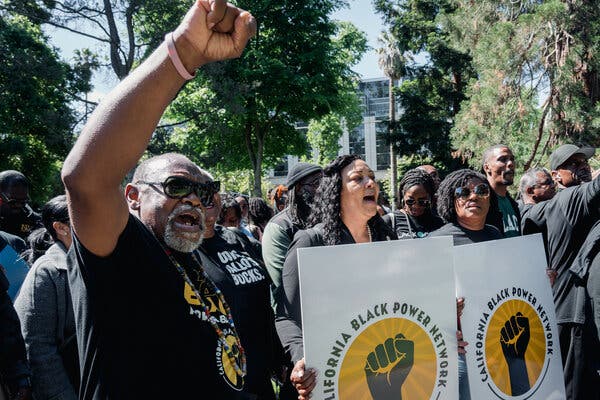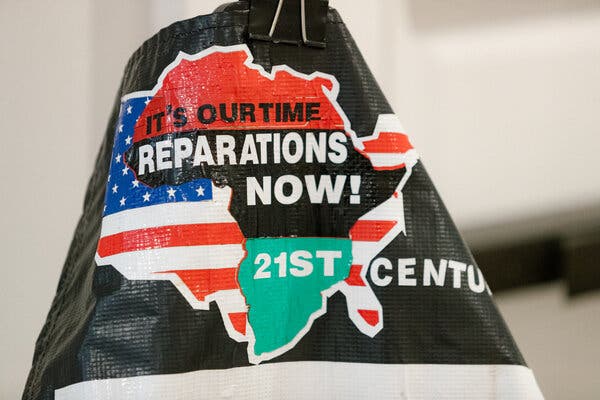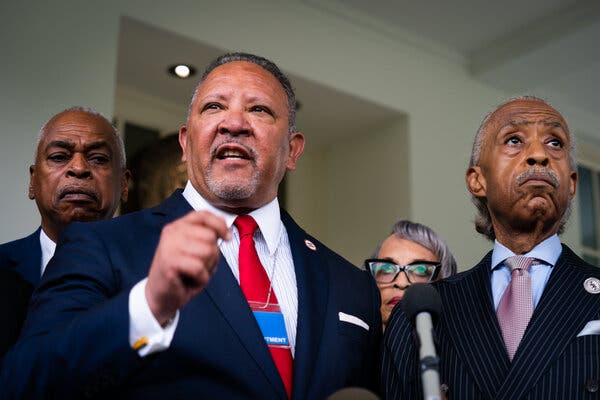Reparations Are a Financial Quandary. For Democrats, They’re a Political One, Too.
Republicans have criticized recent estimates of what Black Americans are owed in reparations. But for Democrats, they pose deeper problems for a party eager to retain the allegiance of Black voters.
Black community groups organized a rally in Sacramento to push the California Legislature to pass bills on social justice and to enact recommendations by a state task force that has examined reparations.Credit...Andri Tambunan for The New York Times




By Trip Gabriel, Maya King, Kurtis Lee and Shawn Hubler
May 27, 2023
What should Americans pay for the legacy of slavery and a century of Jim Crow segregation?
For decades, the question was mostly academic. Then it was seized on by Democrats and activists during a time of racial re-examination after the murder of George Floyd in 2020, and a number of cities and states set up commissions to study reparations to Black Americans.
Now, as those commissions announce their recommendations, the political climate is far different from just three years ago. A widespread “anti-woke” movement on the right has targeted programs aimed at social and racial justice, and the hard-cash figures being proposed as reparations are causing sticker shock. A California task force recently recommended more than $500 billion in reparations to Black residents. San Francisco is considering compensation of $100 billion. And Representative Cori Bush of Missouri said $14 trillion was the true national cost.
Republicans have seized on the figures to argue that the left’s pursuit of social justice has run amok. But for Democrats, the re-emergence of the long-dormant issue poses a deeper set of problems on the horizon.

Signs at the nine-member Reparations Task Force meeting at Mills College at Northeastern University in Oakland, Calif., earlier this month.Credit...Jason Henry for The New York Times
Democratic officials had for years nodded approvingly at the idea of reparations as a far-off ideal to close the racial wealth gap, a position that appealed to many Black voters, who are the party’s most loyal constituency. But the headline-grabbing recommendations by lawmakers and local and state task forces are forcing Democratic leaders to wrestle with financial and political implications sooner than many would have liked.
Few Democrats in positions of power take seriously the possibility of spending billions of dollars to redistribute wealth to the descendants of slaves. But that reality is putting party leaders eager to retain the allegiance of Black voters in the uncomfortable position of finding ways to say no, or not yet, or to change the subject entirely pending some dramatic improvement in the economy.
California’s task force priced the reparations owed to older Black residents at up to $1.2 million each, compensation for the state’s long history of housing discrimination, mass incarceration, unequal health care and other harms outlined in its report. But Gov. Gavin Newsom, a Democrat who signed the law setting up the task force, dodged the issue of costs, declaring that reparations are “about much more than cash payments.”
The board of supervisors in San Francisco expressed support for setting aside $5 million in compensation for some residents, but Mayor London Breed, a Democrat who is Black, has not committed to payments.
Both President Biden and Vice President Kamala Harris, as candidates in 2020, endorsed a federal study of reparations, but they have expended little political capital to advance the project in the White House. Mr. Biden has spoken on the legacy of systemic racism in America, but he has not issued an executive order to create a study commission on reparations, as some have urged.
“As long as people are talking about this, it’s a positive for Democrats,” said David Townsend, a Sacramento-based consultant to many of the moderate Democrats in the California Legislature. “The problems don’t start until you have to start writing the checks.”

“Talk of reparations for Black Americans is not going away,” Marc Morial, president of the National Urban League, said. “This remains unfinished business.”Credit...Sarahbeth Maney/The New York Times
The issue presents a dilemma that quietly divides the Democratic voter base. In polling, Black voters broadly support reparations, but other groups that Democrats cannot afford to push away in the run-up to the 2024 presidential race largely oppose them, including white, Asian and Hispanic voters.
According to a poll of American adults conducted by the Pew Research Center in 2021, fewer than one in three Americans agree that descendants of slaves should be repaid in some way, such as with land or money. Seventy-seven percent of Black adults favored reparations, but only 18 percent of white adults did so. Among Hispanics, support was 39 percent, and among Asians, 33 percent. About half of Democrats said the descendants of enslaved people should be compensated, while only 8 percent of Republicans agreed.
A small group of Black activists has led the push for reparations for years, working largely in academia, think tanks and nonprofit groups. But in the months after Mr. Floyd’s murder, a broader cross section of Americans, including politicians and faith leaders, became more vocal in their calls for direct compensation.
The Rev. Al Sharpton was among those who helped put the issue of reparations on the Democratic political agenda during the party’s 2020 primary.
In an interview, Mr. Sharpton said that even if there were never a payout in hard cash, putting a price tag on injustice was a worthy exercise that forced an examination of history as Republicans broadly deny that past racism has left an unequal playing field today. If provocative dollar amounts caused Americans to consider the scope of the country’s moral obligation to Black people, he suggested, that might lead to a more productive conversation about other ways to meet that debt.
“I think once we get the mainstream America to say — whether they said reluctantly, belatedly or whatever — ‘Yes, we owe,’ then you can have a better discussion on how we pay,” Mr. Sharpton said. “I don’t think that we have successfully had mainstream America have to come to the question of ‘Do we owe?’”
Critics of reparations argue that America already compensated for historic injustice by passing landmark civil rights and voting rights laws in the 1960s and by establishing a social safety net, including welfare programs and affirmative action in college admissions and in hiring, to lift people out of poverty. They say it is morally wrong to force Americans whose ancestors had no role in slavery or Jim Crow to atone for the past, and have raised the possibility of filing legal challenges. The Supreme Court is expected to ban race-conscious college admissions in a decision this spring.
The legal argument from conservative critics of reparations is that government payments based on race violate the equal protection clause of the Constitution. In California, the task force decided eligibility should be tied not just to race but to direct lineage, determining that any descendant of enslaved African Americans or of a “free Black person living in the United States prior to the end of the 19th century” should receive reparations. Some legal scholars have said that using direct lineage has a better chance of withstanding court challenges.
Senator Tim Scott, who is the lone Black Republican in the Senate and who announced a presidential run on Monday, has dismissed the idea of reparations and has been framing a message in the early G.O.P. nominating states that America is a postracial society.
“I am living proof that America is the land of opportunity and not a land of oppression,” Mr. Scott said as he announced his campaign in his hometown of North Charleston, S.C.
The proposals of California’s Reparations Task Force will be forwarded to lawmakers in Sacramento, where they face high political and economic hurdles to become law, even in a state dominated by Democrats. For one thing, the state — whose tax structure leaves it open to wide swings in revenue from one year to another — faces a projected budget deficit of more than $31 billion. Any hearings on proposed laws would not take place until next year.
Although the task force weighed various methods for distributing reparations, such as tuition or housing grants, it settled on direct payments to make up for economic inequality. According to the Federal Reserve Bank of St. Louis, the typical Black family in America is worth $23,000, compared to $184,000 for white families.
“Deficits come and go,” said the Rev. Amos C. Brown, a task force member, who was born in Mississippi during the Jim Crow era. “As a state, we need to have a moral compass that this brutal system of slavery was wrong, and its legacy was embraced here in California.”

Gov. Gavin Newsom, who signed the law setting up the California task force, dodged the issue of costs, declaring that reparations are “about much more than cash payments.”Credit...Jim Wilson/The New York Times
The politics of compensation is complex even in liberal California. More than 40 percent of the state population is Latino, a group that also has faced historic discrimination. Asians are 15 percent, including the descendants of oppressed Chinese immigrant railroad workers. The state has more than 100 federally recognized Native American tribes, many of whom were nearly wiped out in centuries past by white settlers. Only about 6.5 percent of the state’s population is Black.
Democrats in Congress have been introducing a bill since 1989 to create a commission to study reparations, H.R. 40, which is named for the failed Civil War-era promise to freed slaves of “40 acres and a mule.” In 2021, the bill passed the House Judiciary Committee for the first time, but it did not receive a floor vote.
Momentum on the issue shifted in recent years to the state and municipal level. Evanston, Ill., agreed to pay $25,000 to longtime Black residents who suffered under housing discrimination prior to 1970. Asheville, N.C., allocated $2.1 million for reparations that a commission is studying how to spend.
“Talk of reparations for Black Americans is not going away,” said Marc Morial, president of the National Urban League, noting that the federal government paid some forms of reparations to Japanese Americans after their internment in World War II. “This remains unfinished business. The fact that California has done something is a demonstration of the currency of this issue.”
In a parallel to Democrats’ efforts on reparations, Republican-led state governments have pushed to outlaw the influence of critical race theory in schools, public agencies and private companies. Critical race theory is the concept that racism is baked into American institutions and underpins the argument for reparations.
In such a political and economic climate, Black adults are highly skeptical that compensation for slavery and segregation will happen. About six in 10 Black adults who support reparations in the Pew Research Center poll said repayment was not at all likely in their lifetime.
That may explain why Black voters have not yet shown the same frustration with a lack of progress on reparations as they have on other issues, such as voting rights, student-debt forgiveness and police reforms.
“Reparations is not a top-tier issue of concern for African Americans broadly across the country and particularly across any of the battleground states,” said Cornell Belcher, a Democratic pollster and strategist.
Representative Jamaal Bowman of New York, a hard-left Democrat who supports the $14 trillion in reparations proposed by Ms. Bush, the Missouri congresswoman, said the reason Black voters do not rank the issue more highly is simple.
“People have lost hope,” Mr. Bowman said.
He argued that the trillions paid would be an investment that lifts the country’s economy across all demographics. “We haven’t done enough to engage or explain how it would work,” he said. “This is a collective issue of justice for all people.”

Reparations Are a Financial Quandary. For Democrats, They’re a Political One, Too. (Published 2023)
Republicans have criticized recent estimates of what Black Americans are owed in reparations. But for Democrats, they pose deeper problems for a party eager to retain the allegiance of Black voters.
@Supersav @Soul On Ice @FLoss @xfactor @gene cisco @Amajorfucup @Megatron X @gtg305h @KingTaharqa



